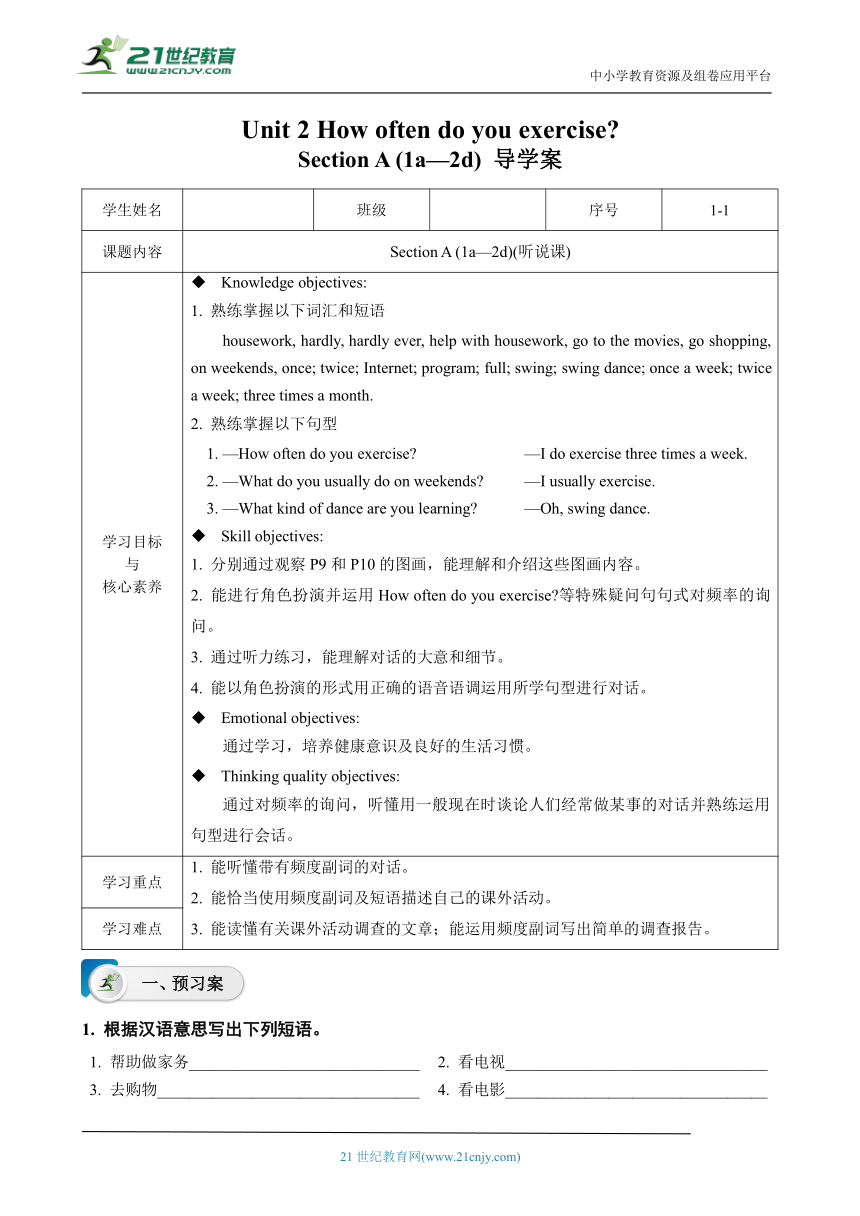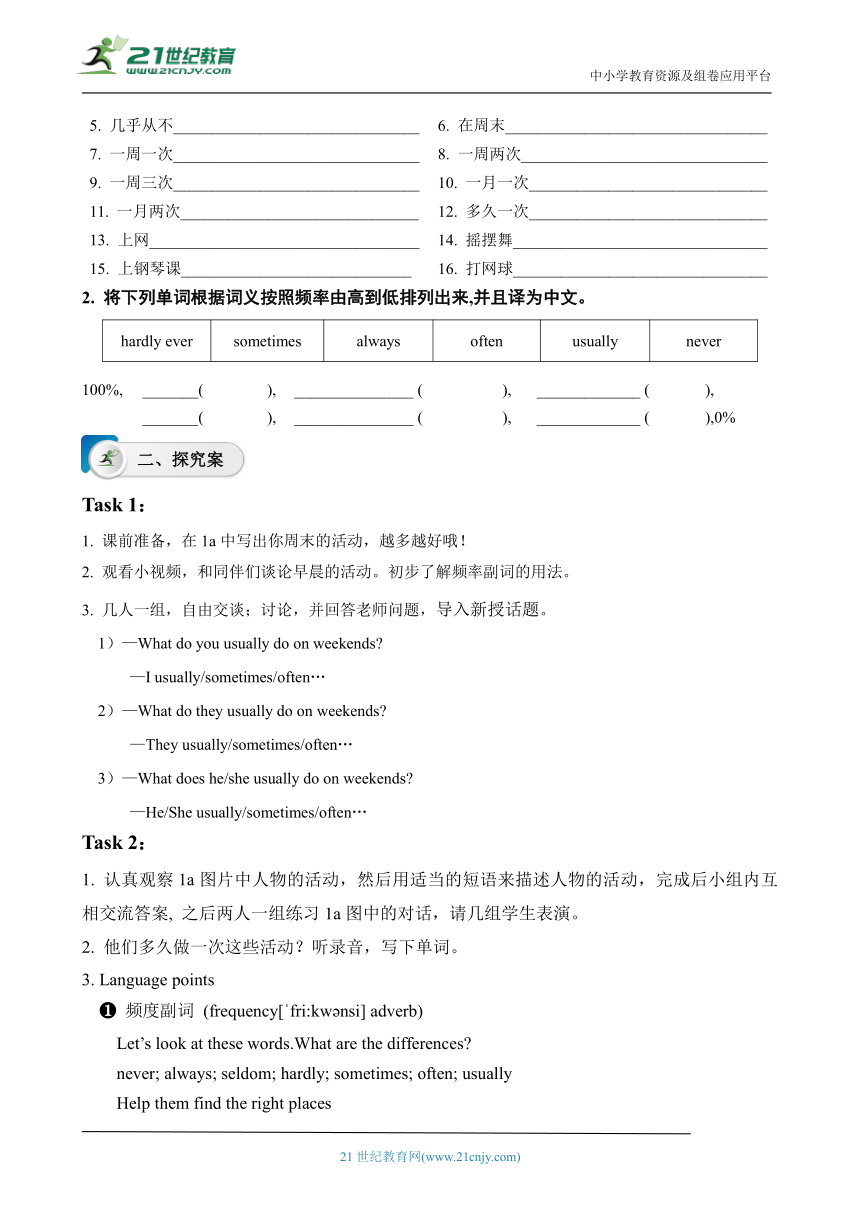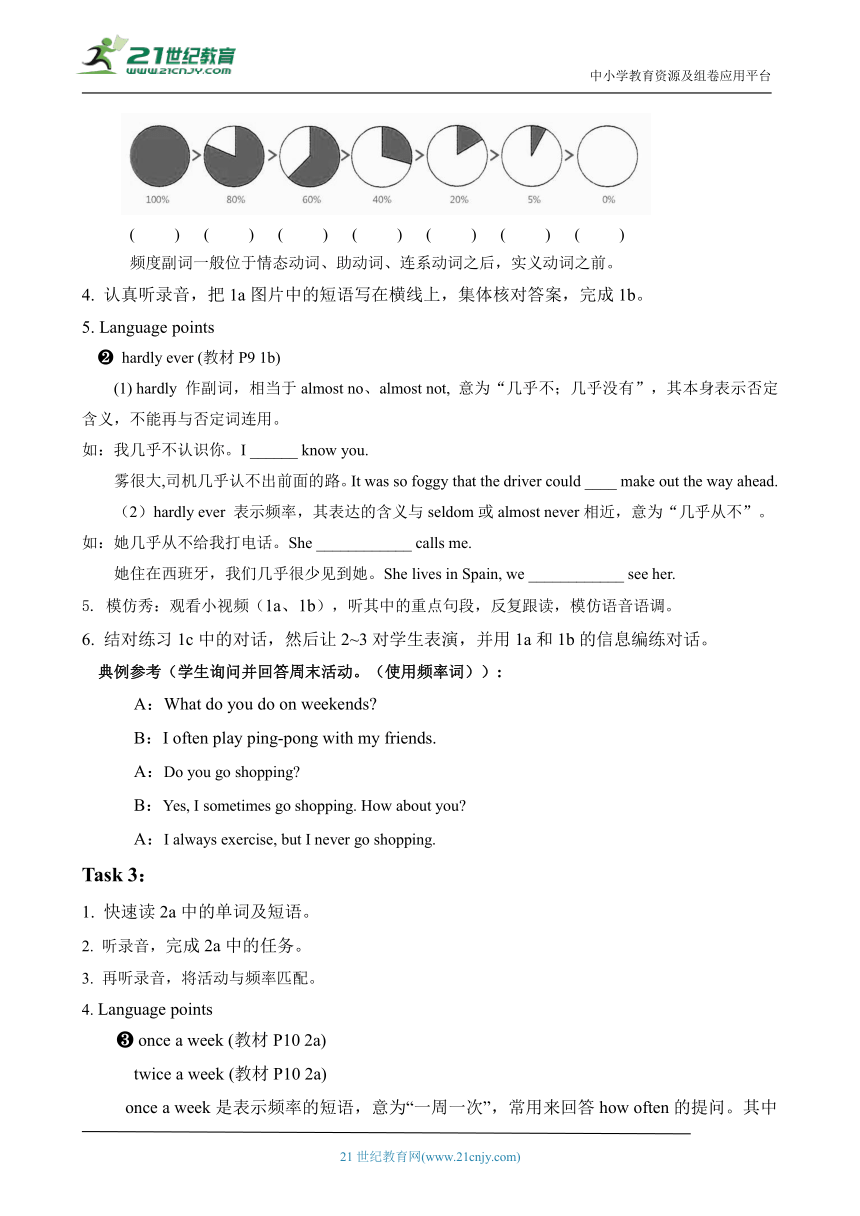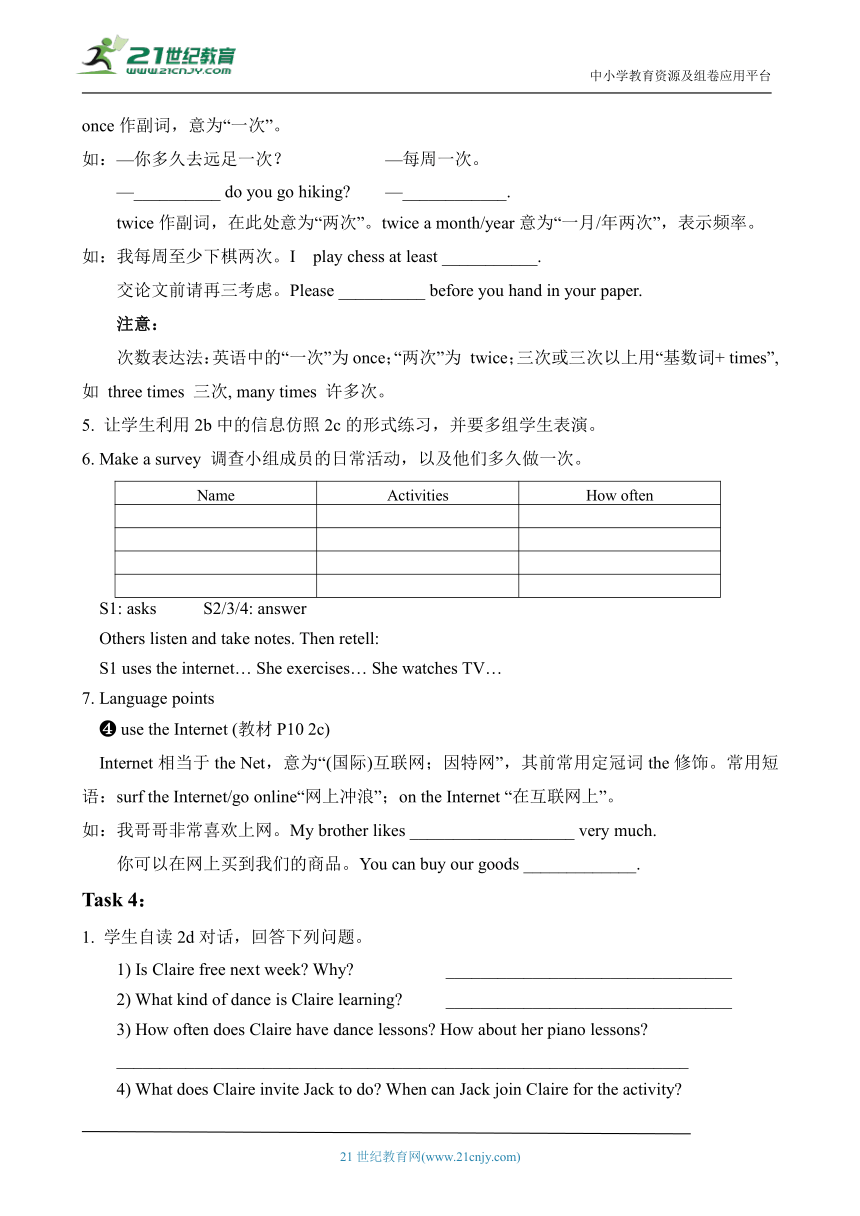【核心素养目标】Unit 2 How often do you exercise Section A 1a-2d 导学案
文档属性
| 名称 | 【核心素养目标】Unit 2 How often do you exercise Section A 1a-2d 导学案 |  | |
| 格式 | docx | ||
| 文件大小 | 1.4MB | ||
| 资源类型 | 试卷 | ||
| 版本资源 | 人教新目标(Go for it)版 | ||
| 科目 | 英语 | ||
| 更新时间 | 2022-08-22 09:36:58 | ||
图片预览




文档简介
中小学教育资源及组卷应用平台
Unit 2 How often do you exercise
Section A (1a—2d) 导学案
学生姓名 班级 序号 1-1
课题内容 Section A (1a—2d)(听说课)
学习目标 与 核心素养 Knowledge objectives: 1. 熟练掌握以下词汇和短语 housework, hardly, hardly ever, help with housework, go to the movies, go shopping, on weekends, once; twice; Internet; program; full; swing; swing dance; once a week; twice a week; three times a month. 2. 熟练掌握以下句型 1. —How often do you exercise —I do exercise three times a week. 2. —What do you usually do on weekends —I usually exercise. 3. —What kind of dance are you learning —Oh, swing dance. Skill objectives: 1. 分别通过观察P9和P10的图画,能理解和介绍这些图画内容。 2. 能进行角色扮演并运用How often do you exercise 等特殊疑问句句式对频率的询问。 3. 通过听力练习,能理解对话的大意和细节。 4. 能以角色扮演的形式用正确的语音语调运用所学句型进行对话。 Emotional objectives: 通过学习,培养健康意识及良好的生活习惯。 Thinking quality objectives: 通过对频率的询问,听懂用一般现在时谈论人们经常做某事的对话并熟练运用句型进行会话。
学习重点 能听懂带有频度副词的对话。 能恰当使用频度副词及短语描述自己的课外活动。 能读懂有关课外活动调查的文章;能运用频度副词写出简单的调查报告。
学习难点
1. 根据汉语意思写出下列短语。
帮助做家务_____________________________ 看电视_________________________________
去购物_________________________________ 看电影_________________________________
几乎从不_______________________________ 在周末_________________________________
一周一次_______________________________ 一周两次_______________________________
一周三次_______________________________ 一月一次______________________________
一月两次______________________________ 多久一次______________________________
上网__________________________________ 摇摆舞________________________________
上钢琴课_____________________________ 打网球________________________________
将下列单词根据词义按照频率由高到低排列出来,并且译为中文。
hardly ever sometimes always often usually never
100%, _______( ), _______________ ( ), _____________ ( ),
_______( ), _______________ ( ), _____________ ( ),0%
Task 1:
1. 课前准备,在1a中写出你周末的活动,越多越好哦!
2. 观看小视频,和同伴们谈论早晨的活动。初步了解频率副词的用法。
3. 几人一组,自由交谈;讨论,并回答老师问题,导入新授话题。
1)—What do you usually do on weekends
—I usually/sometimes/often…
2)—What do they usually do on weekends
—They usually/sometimes/often…
3)—What does he/she usually do on weekends
—He/She usually/sometimes/often…
Task 2:
1. 认真观察1a图片中人物的活动,然后用适当的短语来描述人物的活动,完成后小组内互相交流答案, 之后两人一组练习1a图中的对话,请几组学生表演。
2. 他们多久做一次这些活动?听录音,写下单词。
3. Language points
频度副词 (frequency[ fri:kw nsi] adverb)
Let’s look at these words.What are the differences
never; always; seldom; hardly; sometimes; often; usually
Help them find the right places
( ) ( ) ( ) ( ) ( ) ( ) ( )
频度副词一般位于情态动词、助动词、连系动词之后,实义动词之前。
4. 认真听录音,把1a图片中的短语写在横线上,集体核对答案,完成1b。
5. Language points
hardly ever (教材P9 1b)
(1) hardly 作副词,相当于almost no、almost not, 意为“几乎不;几乎没有”,其本身表示否定含义,不能再与否定词连用。
如:我几乎不认识你。I ______ know you.
雾很大,司机几乎认不出前面的路。It was so foggy that the driver could ____ make out the way ahead.
(2)hardly ever 表示频率,其表达的含义与seldom或almost never相近,意为“几乎从不”。
如:她几乎从不给我打电话。She ____________ calls me.
她住在西班牙,我们几乎很少见到她。She lives in Spain, we ____________ see her.
5. 模仿秀:观看小视频(1a、1b),听其中的重点句段,反复跟读,模仿语音语调。
6. 结对练习1c中的对话,然后让2~3对学生表演,并用1a和1b的信息编练对话。
典例参考(学生询问并回答周末活动。(使用频率词)):
A:What do you do on weekends
B:I often play ping-pong with my friends.
A:Do you go shopping
B:Yes, I sometimes go shopping. How about you
A:I always exercise, but I never go shopping.
Task 3:
1. 快速读2a中的单词及短语。
听录音,完成2a中的任务。
3. 再听录音,将活动与频率匹配。
4. Language points
once a week (教材P10 2a)
twice a week (教材P10 2a)
once a week是表示频率的短语,意为“一周一次”,常用来回答how often的提问。其中once作副词,意为“一次”。
如:—你多久去远足一次? —每周一次。
—__________ do you go hiking —____________.
twice作副词,在此处意为“两次”。twice a month/year意为“一月/年两次”,表示频率。
如:我每周至少下棋两次。I play chess at least ___________.
交论文前请再三考虑。Please __________ before you hand in your paper.
注意:
次数表达法:英语中的“一次”为once;“两次”为 twice;三次或三次以上用“基数词+ times”, 如 three times 三次, many times 许多次。
5. 让学生利用2b中的信息仿照2c的形式练习,并要多组学生表演。
6. Make a survey 调查小组成员的日常活动,以及他们多久做一次。
Name Activities How often
S1: asks S2/3/4: answer
Others listen and take notes. Then retell:
S1 uses the internet… She exercises… She watches TV…
7. Language points
use the Internet (教材P10 2c)
Internet相当于the Net,意为“(国际)互联网;因特网”,其前常用定冠词the修饰。常用短语:surf the Internet/go online“网上冲浪”;on the Internet “在互联网上”。
如:我哥哥非常喜欢上网。My brother likes ___________________ very much.
你可以在网上买到我们的商品。You can buy our goods _____________.
Task 4:
1. 学生自读2d对话,回答下列问题。
1) Is Claire free next week Why _________________________________
2) What kind of dance is Claire learning _________________________________
3) How often does Claire have dance lessons How about her piano lessons
__________________________________________________________________
4) What does Claire invite Jack to do When can Jack join Claire for the activity
__________________________________________________________________
2. 老师讲解2d, 观看摇摆舞视频,并了解摇摆舞。
3. 大声朗读2d的对话,读熟后与同伴结对分角色表演对话。
4. 让3组学生来表演对话。
5. Read the dialogue in 2d, then fill in the blanks.
Next week is quite______ for Claire, for she has to ____ many activities. She has piano lessons______ (two) a week and dance class ______ (one) a week. She also has to __________ with her friends.
6. Language points
Hmm... next week is quite full for me, Jack. (教材P10 2d)
(1) full作形容词,意为“忙的;满的;充满的”,此处意为“忙的”,相当于busy,其反义词是free“空闲的”。
如:他的生活太充实了,没有时间做爱好。His life is ________ to find time for hobbies.
他过着充实的生活。He’d had a very ________.
(2) full作形容词,还可意为“满的;充满的”,反义词为empty“空的”。be full of 与be filled with同义,意为“充满”。
如:房间里挤满了人。The room _________ people./The room ___________ people.
How come 为什么呢?(教材 P10 2d)
How come 常用于英语口语中,可译为“为什呢?”或 “怎么会呢 ”, 既可独立使用,也可在其后接句子,用来询问事情的缘由或状况。
如:今天的天空怎么这么蓝?__________ the sky is so blue today
—汤姆今天没来学校?—Tom didn't come to school today
—真的吗?怎么会? —Really __________
why 其后接的句子要用疑问语序。 你为什么又迟到了?Why are you late again
how come 其后接的句子要用陈述语序。 你怎么又迟到了?How come you are late again
1. 根据汉语提示,完成下列单词的拼写。
—Hi, Amy! What are you doing now
—I’m helping my mother with __________(家务).
My brother’s favorite TV __________(节目) is Keep Running.
Many students use the __________(互联网) to search for information.
I felt so sleepy that I could __________(几乎不) open my eyes.
—Shall we visit the farm this weekend
—I’m afraid I can’t. This weekend is too __________(忙的;满的) for me.
2. 用所给单词的适当形式填空。
On Saturdays, my mother often goes __________(shop) with me at a mall.
Brush your teeth __________(two) a day: after getting up and before bedtime.
Would you like to go to the __________(movie) with me
My sister usually __________(visit) her music teacher on vacation.
She wants __________(dance) with us.
I usually have fast food __________(one) a week.
The little girl sometimes __________(watch) TV at home.
How many __________(time) do you see your grandparents a month
He __________(swing) the gate open just now.
He didn’t go to school. He could __________(hardly) read or write.
3. 根据汉语意思完成句子,每空一词。
“你周末通常做什么 ”
“我通常踢足球。”
—What _________ you _________ _________ on weekends
—I usually play soccer.
“他多久看一次电影 ”“一周一次。”
—_________ _________ _________ he go to the movies
—_________ _________ _________.
“今天早上我起床晚了。”“怎么会呢 ”
—I got up late this morning.
—_________ _________
我爷爷几乎从来不吃甜食。
My grandfather _________ _________eats anything sweet.
“下周你有空吗 ”
“对不起,下周我的安排满满的。”
—Are you _________ next week
—Sorry. Next week _________ _________ _________ me.
训练案答案
1. 根据汉语提示,完成下列单词的拼写。
housework program/show Internet hardly full
2. 用所给单词的适当形式填空。
shopping twice movie(s) visits to dance
once watches times swung hardly
3. 根据汉语意思完成句子,每空一词。
do; usually do How often does; Once a week How come
hardly ever free; is full for
21世纪教育网 www.21cnjy.com 精品试卷·第 2 页 (共 2 页)
21世纪教育网(www.21cnjy.com)
Unit 2 How often do you exercise
Section A (1a—2d) 导学案
学生姓名 班级 序号 1-1
课题内容 Section A (1a—2d)(听说课)
学习目标 与 核心素养 Knowledge objectives: 1. 熟练掌握以下词汇和短语 housework, hardly, hardly ever, help with housework, go to the movies, go shopping, on weekends, once; twice; Internet; program; full; swing; swing dance; once a week; twice a week; three times a month. 2. 熟练掌握以下句型 1. —How often do you exercise —I do exercise three times a week. 2. —What do you usually do on weekends —I usually exercise. 3. —What kind of dance are you learning —Oh, swing dance. Skill objectives: 1. 分别通过观察P9和P10的图画,能理解和介绍这些图画内容。 2. 能进行角色扮演并运用How often do you exercise 等特殊疑问句句式对频率的询问。 3. 通过听力练习,能理解对话的大意和细节。 4. 能以角色扮演的形式用正确的语音语调运用所学句型进行对话。 Emotional objectives: 通过学习,培养健康意识及良好的生活习惯。 Thinking quality objectives: 通过对频率的询问,听懂用一般现在时谈论人们经常做某事的对话并熟练运用句型进行会话。
学习重点 能听懂带有频度副词的对话。 能恰当使用频度副词及短语描述自己的课外活动。 能读懂有关课外活动调查的文章;能运用频度副词写出简单的调查报告。
学习难点
1. 根据汉语意思写出下列短语。
帮助做家务_____________________________ 看电视_________________________________
去购物_________________________________ 看电影_________________________________
几乎从不_______________________________ 在周末_________________________________
一周一次_______________________________ 一周两次_______________________________
一周三次_______________________________ 一月一次______________________________
一月两次______________________________ 多久一次______________________________
上网__________________________________ 摇摆舞________________________________
上钢琴课_____________________________ 打网球________________________________
将下列单词根据词义按照频率由高到低排列出来,并且译为中文。
hardly ever sometimes always often usually never
100%, _______( ), _______________ ( ), _____________ ( ),
_______( ), _______________ ( ), _____________ ( ),0%
Task 1:
1. 课前准备,在1a中写出你周末的活动,越多越好哦!
2. 观看小视频,和同伴们谈论早晨的活动。初步了解频率副词的用法。
3. 几人一组,自由交谈;讨论,并回答老师问题,导入新授话题。
1)—What do you usually do on weekends
—I usually/sometimes/often…
2)—What do they usually do on weekends
—They usually/sometimes/often…
3)—What does he/she usually do on weekends
—He/She usually/sometimes/often…
Task 2:
1. 认真观察1a图片中人物的活动,然后用适当的短语来描述人物的活动,完成后小组内互相交流答案, 之后两人一组练习1a图中的对话,请几组学生表演。
2. 他们多久做一次这些活动?听录音,写下单词。
3. Language points
频度副词 (frequency[ fri:kw nsi] adverb)
Let’s look at these words.What are the differences
never; always; seldom; hardly; sometimes; often; usually
Help them find the right places
( ) ( ) ( ) ( ) ( ) ( ) ( )
频度副词一般位于情态动词、助动词、连系动词之后,实义动词之前。
4. 认真听录音,把1a图片中的短语写在横线上,集体核对答案,完成1b。
5. Language points
hardly ever (教材P9 1b)
(1) hardly 作副词,相当于almost no、almost not, 意为“几乎不;几乎没有”,其本身表示否定含义,不能再与否定词连用。
如:我几乎不认识你。I ______ know you.
雾很大,司机几乎认不出前面的路。It was so foggy that the driver could ____ make out the way ahead.
(2)hardly ever 表示频率,其表达的含义与seldom或almost never相近,意为“几乎从不”。
如:她几乎从不给我打电话。She ____________ calls me.
她住在西班牙,我们几乎很少见到她。She lives in Spain, we ____________ see her.
5. 模仿秀:观看小视频(1a、1b),听其中的重点句段,反复跟读,模仿语音语调。
6. 结对练习1c中的对话,然后让2~3对学生表演,并用1a和1b的信息编练对话。
典例参考(学生询问并回答周末活动。(使用频率词)):
A:What do you do on weekends
B:I often play ping-pong with my friends.
A:Do you go shopping
B:Yes, I sometimes go shopping. How about you
A:I always exercise, but I never go shopping.
Task 3:
1. 快速读2a中的单词及短语。
听录音,完成2a中的任务。
3. 再听录音,将活动与频率匹配。
4. Language points
once a week (教材P10 2a)
twice a week (教材P10 2a)
once a week是表示频率的短语,意为“一周一次”,常用来回答how often的提问。其中once作副词,意为“一次”。
如:—你多久去远足一次? —每周一次。
—__________ do you go hiking —____________.
twice作副词,在此处意为“两次”。twice a month/year意为“一月/年两次”,表示频率。
如:我每周至少下棋两次。I play chess at least ___________.
交论文前请再三考虑。Please __________ before you hand in your paper.
注意:
次数表达法:英语中的“一次”为once;“两次”为 twice;三次或三次以上用“基数词+ times”, 如 three times 三次, many times 许多次。
5. 让学生利用2b中的信息仿照2c的形式练习,并要多组学生表演。
6. Make a survey 调查小组成员的日常活动,以及他们多久做一次。
Name Activities How often
S1: asks S2/3/4: answer
Others listen and take notes. Then retell:
S1 uses the internet… She exercises… She watches TV…
7. Language points
use the Internet (教材P10 2c)
Internet相当于the Net,意为“(国际)互联网;因特网”,其前常用定冠词the修饰。常用短语:surf the Internet/go online“网上冲浪”;on the Internet “在互联网上”。
如:我哥哥非常喜欢上网。My brother likes ___________________ very much.
你可以在网上买到我们的商品。You can buy our goods _____________.
Task 4:
1. 学生自读2d对话,回答下列问题。
1) Is Claire free next week Why _________________________________
2) What kind of dance is Claire learning _________________________________
3) How often does Claire have dance lessons How about her piano lessons
__________________________________________________________________
4) What does Claire invite Jack to do When can Jack join Claire for the activity
__________________________________________________________________
2. 老师讲解2d, 观看摇摆舞视频,并了解摇摆舞。
3. 大声朗读2d的对话,读熟后与同伴结对分角色表演对话。
4. 让3组学生来表演对话。
5. Read the dialogue in 2d, then fill in the blanks.
Next week is quite______ for Claire, for she has to ____ many activities. She has piano lessons______ (two) a week and dance class ______ (one) a week. She also has to __________ with her friends.
6. Language points
Hmm... next week is quite full for me, Jack. (教材P10 2d)
(1) full作形容词,意为“忙的;满的;充满的”,此处意为“忙的”,相当于busy,其反义词是free“空闲的”。
如:他的生活太充实了,没有时间做爱好。His life is ________ to find time for hobbies.
他过着充实的生活。He’d had a very ________.
(2) full作形容词,还可意为“满的;充满的”,反义词为empty“空的”。be full of 与be filled with同义,意为“充满”。
如:房间里挤满了人。The room _________ people./The room ___________ people.
How come 为什么呢?(教材 P10 2d)
How come 常用于英语口语中,可译为“为什呢?”或 “怎么会呢 ”, 既可独立使用,也可在其后接句子,用来询问事情的缘由或状况。
如:今天的天空怎么这么蓝?__________ the sky is so blue today
—汤姆今天没来学校?—Tom didn't come to school today
—真的吗?怎么会? —Really __________
why 其后接的句子要用疑问语序。 你为什么又迟到了?Why are you late again
how come 其后接的句子要用陈述语序。 你怎么又迟到了?How come you are late again
1. 根据汉语提示,完成下列单词的拼写。
—Hi, Amy! What are you doing now
—I’m helping my mother with __________(家务).
My brother’s favorite TV __________(节目) is Keep Running.
Many students use the __________(互联网) to search for information.
I felt so sleepy that I could __________(几乎不) open my eyes.
—Shall we visit the farm this weekend
—I’m afraid I can’t. This weekend is too __________(忙的;满的) for me.
2. 用所给单词的适当形式填空。
On Saturdays, my mother often goes __________(shop) with me at a mall.
Brush your teeth __________(two) a day: after getting up and before bedtime.
Would you like to go to the __________(movie) with me
My sister usually __________(visit) her music teacher on vacation.
She wants __________(dance) with us.
I usually have fast food __________(one) a week.
The little girl sometimes __________(watch) TV at home.
How many __________(time) do you see your grandparents a month
He __________(swing) the gate open just now.
He didn’t go to school. He could __________(hardly) read or write.
3. 根据汉语意思完成句子,每空一词。
“你周末通常做什么 ”
“我通常踢足球。”
—What _________ you _________ _________ on weekends
—I usually play soccer.
“他多久看一次电影 ”“一周一次。”
—_________ _________ _________ he go to the movies
—_________ _________ _________.
“今天早上我起床晚了。”“怎么会呢 ”
—I got up late this morning.
—_________ _________
我爷爷几乎从来不吃甜食。
My grandfather _________ _________eats anything sweet.
“下周你有空吗 ”
“对不起,下周我的安排满满的。”
—Are you _________ next week
—Sorry. Next week _________ _________ _________ me.
训练案答案
1. 根据汉语提示,完成下列单词的拼写。
housework program/show Internet hardly full
2. 用所给单词的适当形式填空。
shopping twice movie(s) visits to dance
once watches times swung hardly
3. 根据汉语意思完成句子,每空一词。
do; usually do How often does; Once a week How come
hardly ever free; is full for
21世纪教育网 www.21cnjy.com 精品试卷·第 2 页 (共 2 页)
21世纪教育网(www.21cnjy.com)
同课章节目录
- Unit 1 Where did you go on vacation?
- Section A
- Section B
- Unit 2 How often do you exercise?
- Section A
- Section B
- Unit 3 I'm more outgoing than my sister.
- Section A
- Section B
- Unit 4 What's the best movie theater?
- Section A
- Section B
- Unit 5 Do you want to watch a game show?
- Section A
- Section B
- Unit 6 I'm going to study computer science.
- Section A
- Section B
- Unit 7 Will people have robots?
- Section A
- Section B
- Unit 8 How do you make a banana milk shake?
- Section A
- Section B
- Unit 9 Can you come to my party?
- Section A
- Section B
- Unit 10 If you go to the party, you'll have a grea
- Section A
- Section B
